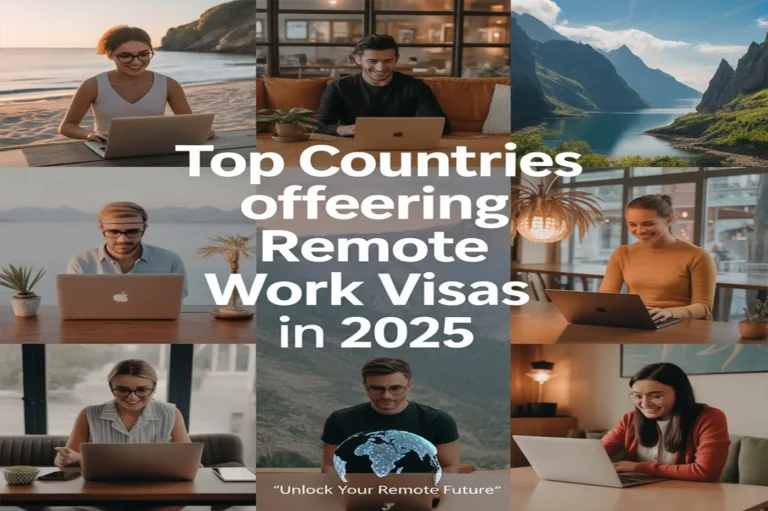The world of work is more globalized than ever before. Thanks to evolving immigration policies and remote-first workplace culture, it’s now possible to land a remote job that also offers visa sponsorship, allowing you to work for an international employer and relocate legally to another country.
But here’s the catch, these opportunities are competitive, often hidden, and misunderstood by many applicants.
In this guide, I will show you how to find, assess, and secure remote jobs that offer visa sponsorship, even if you don’t live in the same country as the employer.
This is suitable for professionals such as software developers seeking to relocate to Europe, marketing professionals in India hoping to move to Canada or any of such similar relocation desires, this guide will walk you through the tools, strategies, and best practices to make it happen in 2025.
What Is a Visa-Sponsored Remote Job?
A visa-sponsored remote job is one where a company:
- Hires you to work remotely initially
- Supports or initiates a work visa application
- May assist you to relocate legally for in-office or hybrid roles later
Many companies do this to attract top global talent or when expanding operations into new regions. In some cases, a remote role transitions into a relocation opportunity once trust and performance are established.
Can Remote Workers Qualify for Visa Sponsorship?
Yes, especially in sectors where skills shortages exist (e.g. tech, AI, finance, healthcare, engineering).
Remote workers may be sponsored in two main situations:
- Remote-first companies willing to sponsor relocation for top performers
- Hybrid/in-office roles that start remotely while paperwork is processed
You need to meet:
- The company’s hiring requirements
- The government’s visa eligibility (education, salary level, background check)
Example
A Berlin-based SaaS company may hire you as a senior product designer in Kenya, allow you to work remotely for 3 to 6 months, then initiate a Blue Card visa to legally relocate you to Germany.
Types of Work Visas Available for Remote Workers
Below are some visas that can be paired with sponsored remote work:
| Country | Visa Type | Notes |
| Germany | EU Blue Card | High-skill, fast-track, employer sponsorship required |
| UK | Skilled Worker Visa | Must have a job offer and a licensed sponsor |
| Canada | Global Talent Stream | Fast-track for tech jobs; LMIA needed |
| US | H-1B Visa | Requires sponsorship, lottery system |
| UAE | Employer-Sponsored Work Visa | Open to foreign professionals |
| Netherlands | Highly Skilled Migrant Visa | Sponsored by Dutch employers |
Some countries also offer Digital Nomad Visas, but these don’t require sponsorship since you’re technically not employed locally.
Best Platforms to Find Visa-Sponsored Remote Jobs
Several platforms allow you to filter remote jobs by visa sponsorship. Here are the most reliable ones in 2025:
Top Global Job Boards
Platform | Features |
Filter by “Visa Sponsorship Offered” | |
Tags jobs that offer relocation | |
UK/EU-based startup jobs; visa tags included | |
Search by tech stack and visa policy | |
Use filters and keywords like “visa sponsor” |
Top Remote-Friendly Companies That Offer Sponsorship
Many global companies are open to sponsoring exceptional talent, especially in tech, product, or engineering roles.
Companies Known for Visa Sponsorship + Remote Culture:
| Company | Notes |
| GitLab | Fully remote, sponsors globally |
| Automattic | Remote-first, WordPress parent, hires globally |
| Shopify | Hybrid model, offers relocation & sponsorship |
| Doist | Remote-first, international teams |
| Spotify | Remote/flexible in many regions |
| Klarna | Fintech firm hiring globally with relocation |
| Stripe | High-growth startup, tech sponsorship available |
| Zalando | Germany-based, supports visa/relocation |
| Canva | Australian unicorn, global hiring |
| Datadog | Actively sponsors dev roles in EU and US |
How to Tailor Your Resume for Visa-Sponsored Roles
Employers are taking a risk when sponsoring, so your resume must eliminate doubt.
- Include exact job title in your resume and match job keywords
- Highlight international experience or remote work tools (Slack, Jira, Zoom)
- Add a line in your cover letter: eg. “Open to visa sponsorship and relocation. Eligible for EU/UK/US work permits.”
- List language proficiency and adaptability to time zones
- Quantify your results to prove ROI
Red Flags: Avoiding Scams and Misleading Offers
Unfortunately, many scams target global remote job seekers offering “guaranteed” sponsorship.
Warning Signs:
- No verifiable company address or website
- Requests for “visa processing fees” upfront
- Free email domains like @gmail.com for business hiring
- No formal contract, just chat-based offers
- Vague job descriptions and unrealistic pay (e.g. $5k/week entry-level roles)
Rule of Thumb:
You should never pay a recruiter, agent, or company directly for visa processing. Sponsorship costs are always covered by the employer.
How to Talk About Sponsorship During Interviews
Timing and tone are critical.
Best Practices
- Wait until the 2nd or 3rd interview unless the job post explicitly says “visa sponsorship available”
- Phrase it positively, like: “I’m fully authorized to work remotely from my current location and am open to relocation if sponsorship is available.”
- Ask smart follow-up questions: “Does your company have experience sponsoring visas for international hires?”
Country-Specific Tips: US, UK, Canada, Germany & UAE
United States
- H-1B and L-1 are most common
- Sponsorship often requires lottery (apply early in the year)
- Target mid-to-large firms with in-house immigration teams
United Kingdom
- Focus on Tier 2 Skilled Worker Visa
- Use UK Government’s licensed sponsor list
- Look at healthcare, IT, and finance roles
Canada
- Global Talent Stream allows 2-week fast-track processing
- Use platforms like Job Bank
- Look for “Labour Market Impact Assessment” or LMIA-exempt jobs
Germany
- Blue Card is common for high-skilled professionals
- Must meet salary threshold (around €45,000+ annually)
- Many startups in Berlin, Munich offer relocation for dev roles
United Arab Emirates
- Easier for tech, sales, and healthcare
- Employer typically handles all visa paperwork
- Dubai and Abu Dhabi are hot zones for sponsored roles
Action Plan
Finding a visa-sponsored remote job is possible, but requires intention, research, and resilience.
Here’s your action plan:
- Use job boards that allow sponsorship filtering
- Prioritize companies known to hire global talent
- Tailor your resume for international readability
- Verify the offer’s authenticity before committing
- Be transparent about sponsorship needs, but tactful
Borders may be flexible, but only for those who prepare smartly. With the right tools, mindset, and application strategy, you can land a remote job that sponsors your dream of working and living abroad.




am skilled plumber 24 years experience with a valid passport an drivers licence willing to relocate anytime
I’m Federal Civil Servant with over 20yrs admininstrative experience in the water, agricultural, mines and innovation sectors within my service years in Nigeria Civil Service, I have recently acquired a certification in Machine Learning from india, can I get any sponsorship opportunities out there?